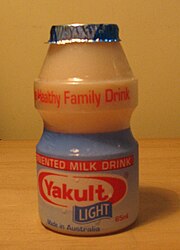Yakult (ヤクルト Yakuruto) is a Japanese probiotic milk-like product made by fermenting a mixture of skimmed milk with a special strain of the bacteria Lactobacillus casei Shirota. Yakult Honsha Co., Ltd. (株式会社ヤクルト本社 Kabushiki-gaisha Yakuruto Honsha) (TYO: 2267) It was created by Minoru Shirota who graduated from the Medical School of Kyoto University in 1930. In 1935, he started manufacturing and selling Yakult. Official claims state that the name is derived from jahurto, an older form of jogurto, the Esperanto word for "yogurt".[1][2] Since then, Yakult has also introduced a line of beverages for the Japanese market that contain Bifidobacterium breve bacteria, and has also used its lactobacilli research to develop cosmetics. More recently, the Yakult Honsha played a major role in developing the chemotherapy drug irinotecan (Camptosar, CPT-11).[3]
Yakult also owns one of Japan's major baseball franchises, the Tokyo Yakult Swallows.
After its introduction in Japan and Taiwan, Yakult was first sold in the Western world in Brazil in 1966, due to the large number of Japanese immigrants in the country, before it was marketed elsewhere[4]. Today, Yakult is sold in 31 countries[5], although its bacteria cultures are provided from a mother strain from Japan regardless of production location.[citation needed]
Yakult is marketed in different sizes. In Australia, Europe and Indonesia, Yakult comes in 65mL bottles. In America, Japan and the Philippines, 80 ml bottles are available. In Singapore (where it is known as 益多 yì duō), Taiwan (where it is known as 養樂多 yǎng lè duō) and mainland China (where it is known as 益力多 yì lì duō), it comes in 100 ml bottles. [6][7][8] In South Korea, where it is also produced, it is called yakult (hangul: 야쿠르트) and is marketed by the Korea Yakult company.
Singapore is the only country where Yakult is available in flavors (orange, grape, and apple) other than the original.
Ingredients
Standard Yakult (excludes variations such as in Yakult Light) contains [9]:
- Sugar (sucrose) to balance sourness with sweetness.
- Skim milk powder
- Dextrose
- Natural flavours
- Live Lactobacillus casei shirota strain , 6.5 billions per 65 mL bottle (concentration of 108 CFU/mL)
- Water
Scientific basis
The claimed benefits are supported by an array of scientific studies according to the manufacturer website [1]. Those could range from maintenance of gut flora [2], modulation of the immune system [3], regulation of bowel habits and constipation [4] and finally effects on some gastro-intestinal infections [5].
Although the number of scientific papers is certainly large, most of them are related to in vitro and in vivo experiments, with some human clinical trials done on cohorts[10][11][12] and with daily consumption of 40-100 billions of probiotic L. casei shirota [6], far above the single bottle concentration of approximately 6 billion.
Nutrition Facts
Standard Yakult contains 18g of sugar for every 100g, but comes in 65 mL bottles. This concentration is higher than the level defined as “HIGH” by the UK Food Standards Agency (described for concentrations of sugar above 15g per 100g)[7]. As a comparison Coca-Cola and orange juices are in the range of 10g of sugar per 100g, but with a serving size usually higher than 250 ml the total sugar quantity is higher. Based on the content of milk protein (1.4 g per 100 mL [8]), it is not classified as a flavoured fermented milk of the Codex Standard for Fermented Milks. However, based on the existence of many products like Yakult in the world market, a new category is going to be established into the current Codex Standard for Fermented Milks.
Through Nutrient profiling guidelines, current health claim regulation in European Union may forbid the use of health claim on food products that are nutritionally unbalanced, but dairy products and probiotic drinks are likely to be considered as favorable carrier because their health benefits outweigh the fact they might be high in one of the designated 'unhealthy' ingredients [9].






























